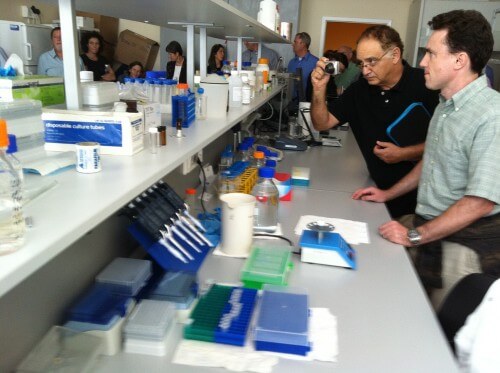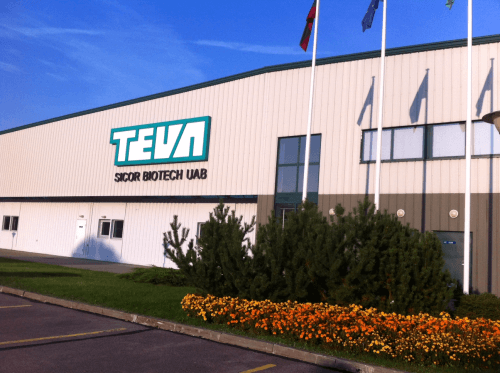In the past, Lithuania served as the parent of the life sciences industry when it hosted the Center for Enzymology during the Soviet Union. Two companies grew out of this center, one of which was purchased by Teva, while the original institute is currently used by the Department of Biotechnology of the University of Vilnius, which works wonders with a zero budget. Official tour

During the Life Science Baltics conference, a group of about 40 Israelis toured - many of them employees of biotechnology companies, and others in the biotechnology centers of Vilnius. I accompanied the group during a tour that included a visit to a place dryly called the Institute of Biotechnology at the University of Vilnius, but in fact it is a place with a glorious history. It was used by the Institute for Enzymes during the Soviet Union. There were a total of four such institutes all over the powerhouse.
The Soviet building seems a bit large for the modest center, which contains six departments in which basic and somewhat applied research is conducted in fields that are not foreign to the ears of Israeli biotechnologists: the Department for the Interaction between Proteins and DNA, the Department for Biological DNA Modification (Department of Biological DNA Modification), the Department of Engineering Genetics of Eukaryotes, the Department of Immunology and Cell Biology, the Department of Biothermodynamics and Drug Design, and the Department of Bioinformatics.
After the tour of these modest laboratories and a completely different tour in Hebrew around the Jewish sites in Vilnius, we arrived at a place with a high budget several orders of magnitude compared to the Department of Biotechnology at the university. This is actually one of its two major spin-offs: the company Teva-Sikor, which develops biological drugs for cancer (also in the second spin-off - Thermo Fisher Scientific, a tour of a similar group of Israelis was held, but I was not present, because it was at the same time AB)
Gedarius Zonda, director of Teva-Sikor factory in Vilnius hosted us there. At the beginning of his speech, Zonda described the activities of the Sicor Biotech company in three areas: creation of biological drugs, research and development in the field of biological drugs, as well as marketing in the Baltic countries (Lithuania, Latvia and Estonia).

The plant was founded in 1984, that is, still during the Soviet Union as the biopharma division in the Institute of Applied Enzymology mentioned above. In 1995, four years after the independence of Lithuania, the institute was privatized and JSC Biofa was established. In 1999, Biotech was acquired by Biotech and a biopharma production facility was established. In 2001, Sykur acquired Biotech and the company changed its name to Sykur Biotech. In 2004 Teva bought Sikor and with it Sikor Biotech. In recent years, the factory has been expanding and tens of millions of dollars have been invested in it.
In 1994, the company registered the human recombinant protein a-2b with IFN. In 2008, the recombinant human growth hormone was registered in Lithuania, in 2012, the recombinant human filgrastim was registered in the European Union and in the same year it was also registered in the USA (FDA).
The plant employs 220 people in the entire company, of which 155 work in biotechnological activities. 80% of the employees are university graduates in the field of bioengineering, molecular biology, biochemistry, biology and related fields. The personnel involved in production, quality control and R&D have over 10 years of experience in biopharma R&D and production.
In the R&D center there is a department for the development of DP formulations, F&F development, and analytical development. The R&D center also includes a factory for pilot production, a unit for increasing production and a modern system for the production of recombinant proteins
The factory is approved by international and local authorities (EU, USA, Israel, Russia, Australia, Ukraine, Brazil, Mexico, etc.).
The drugs produced at the factory are: Tevagrastim intended for the prevention and treatment of various forms of neutropenia caused by chemotherapy or bone marrow transplantation; Recombinant human interferon intended for acute hepatitis B and chronic hepatitis C.
After these explanations, we went down in protective suits against dust to the laboratories where these proteins are produced.
Previous articles from the Life Science Baltics conference
